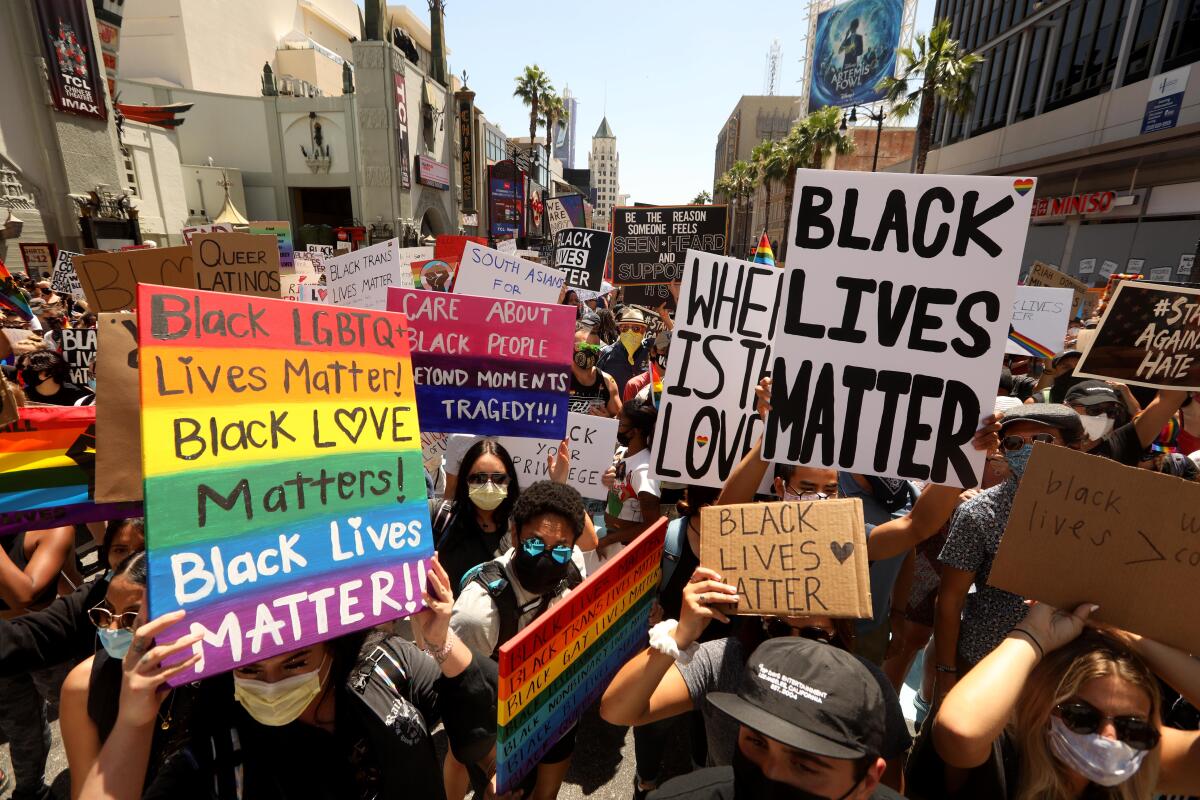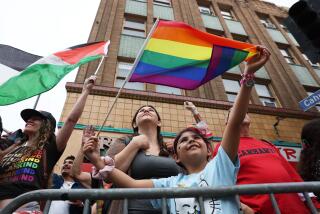Column: I’m Black. I’m gay. The high court proved there’s nothing equal about equal rights

- Share via
I’m Black. I’m gay. And I’m just going to say it: Monday was a wash for equal rights.
On the one hand, the Supreme Court ruled that Title VII of the Civil Rights Act of 1964, which bans workplace discrimination based on “race, color, religion, sex, or national origin,” does indeed protect gay and transgender Americans.
“The answer is clear,” Justice Neil M. Gorsuch wrote for the 6-3 majority. “An employer who fires an individual for being homosexual or transgender fires that person for traits or actions it would not have questioned in members of a different sex. Sex plays a necessary and undistinguishable role in the decision, exactly what Title VII forbids.”
Far from the stunning decision some have made it out to be, we’re talking about basic rights. Rights that, for the most part, have ceased to be seen as controversial or as making some sort of political statement. And this is true not just in California, but in states all over the country.
On the other hand, the Supreme Court declined to hear — count ‘em — eight separate cases that would have opened the door to challenging “qualified immunity,” the doctrine that protects police officers from civil lawsuits alleging brutality and other civil rights violations.
So ridiculous was this turn of events that even Justice Clarence Thomas, the court’s only Black and most obtusely conservative member, issued an unusual dissent.
At a time when protests are still popping up daily to denounce injustice at the hands — and sometimes knees — of police, it’s hard not to compare the pace of change and acceptance for the LGBTQ community and the Black community.
Being Black and demanding equal rights is still very much a controversial and a political statement. But being gay or lesbian or bisexual and demanding the same? Not as much. Not anymore.
Think about it.
It was only eight years ago that Joe Biden, then vice president and now the presumptive Democratic nominee for president, caused a firestorm by merely saying that gay people should have another type of basic equal rights.
“I am absolutely comfortable with the fact that men marrying men, women marrying women and heterosexual men and women marrying one another are entitled to the same exact rights, all the civil rights, all the civil liberties,” he told NBC’s “Meet the Press.”
Three days later, Obama, clearly trying to save face, followed suit. A few years after that, the Supreme Court ruled that same-sex couples have the right to get married.
And now, every June, corporations spend millions of dollars developing parade floats, rainbow-colored sneakers and shirts and backpacks, and ad campaigns to tout their commitment to diversity.
In a normal year, the pride parades in Los Angeles and San Francisco are so dominated by Twitter and Google and Netflix and Hulu and Wells Fargo and JPMorgan Chase and the like that it’s almost impossible to catch a glimpse of a church or a small nonprofit that does real grass-roots work on the ground.
Though it started as a protest, ironically by transgender people of color demanding equal rights, pride today is typically thought of as a harmless party.
I’m not saying discrimination has completely disappeared for the LGBTQ community. Far from it. Especially for transgender Americans, who just last week watched as the Trump administration rolled back protections against sex discrimination for patients under the Affordable Care Act.
But why is it that holding a pride celebration didn’t become something akin to a holding political event until word got out about a possible partnership with Black Lives Matter? Even though the many protests in L.A. have been peaceful for more than a week, there’s still clearly some fear out there that things might turn ugly.
On Sunday, though, thousands of gathered for an “All Black Lives Matter” march, starting in front of the TCL Chinese Theatre on Hollywood Boulevard before heading the few miles into West Hollywood. It was a beautiful act of protest and solidarity meant to build bridges, as there has always been more than a touch of homophobia in the Black community and far more than a touch of racism in the LGBTQ community.
But the very existence of the march also made abundantly clear how far we have to go.
In West Hollywood, I watched as people ate brunch on the newly reopened patio of Rocco’s and ignored the dozens of protesters chanting “no justice, no peace” while blocking Santa Monica Boulevard.
All around, the names of the Black and dead were scrawled in rainbow colors. On the glass of the patio. In chalk on the ground. Michael Brown. Tamir Rice. Tony McDade. John Crawford III. Natasha McKenna. Walter Scott. George Floyd. But still the brunch eaters were oblivious.
Meanwhile, several storefronts remained covered in plywood on Sunday. Perhaps the owners of those shops and restaurants were worried or afraid that thieves would snatch up their merchandise or that vandals would shatter or spray-paint their windows?
The truth might be a lot more complex, but the more simplistic message came through loud and clear, and it was disappointing.
It’s going to take more than a few murals on plywood insisting Black Lives Matter to rectify that.
As a friend — Black, gay, from West Virginia and seemingly out since birth — once told me: “You’ll know you’re done coming out,” pausing to rub his lips together with the shiniest lip gloss I’d ever seen, “when you’re as comfortable with your gayness as your blackness.”
Those words stuck with me. Today, thinking of the protests, I’d tweak and flip them.
When America is as comfortable with blackness as gayness, then you’ll know we’re done coming out.
More to Read
Sign up for Essential California
The most important California stories and recommendations in your inbox every morning.
You may occasionally receive promotional content from the Los Angeles Times.










